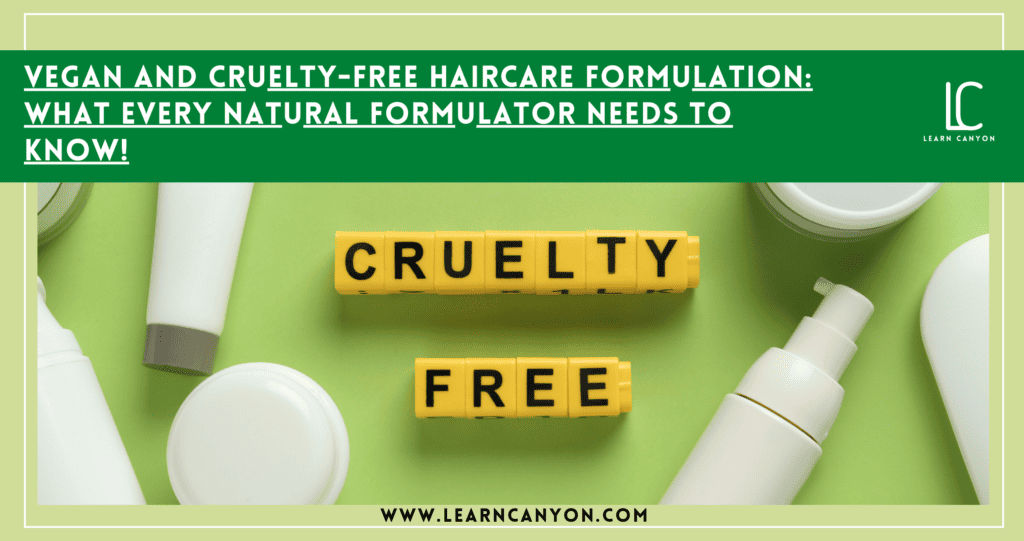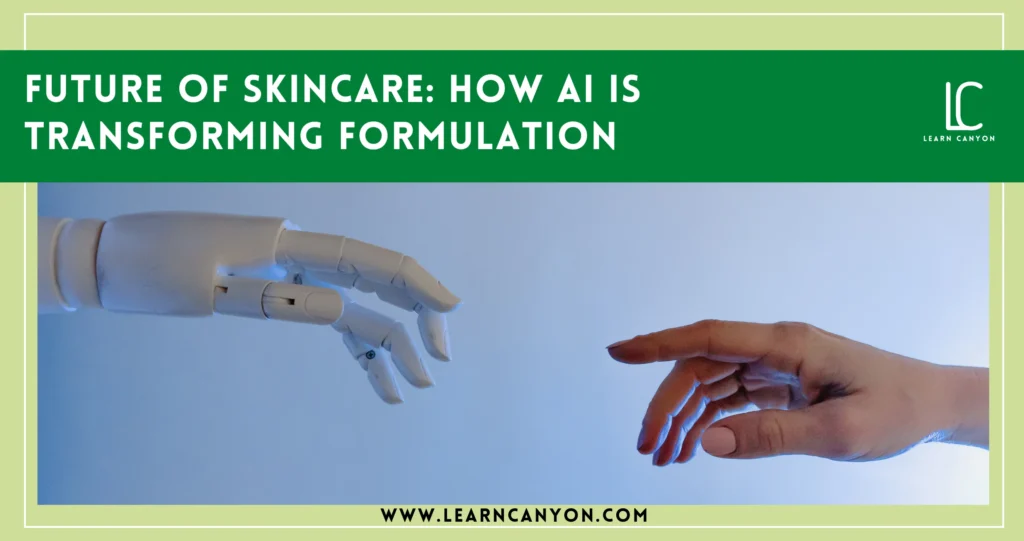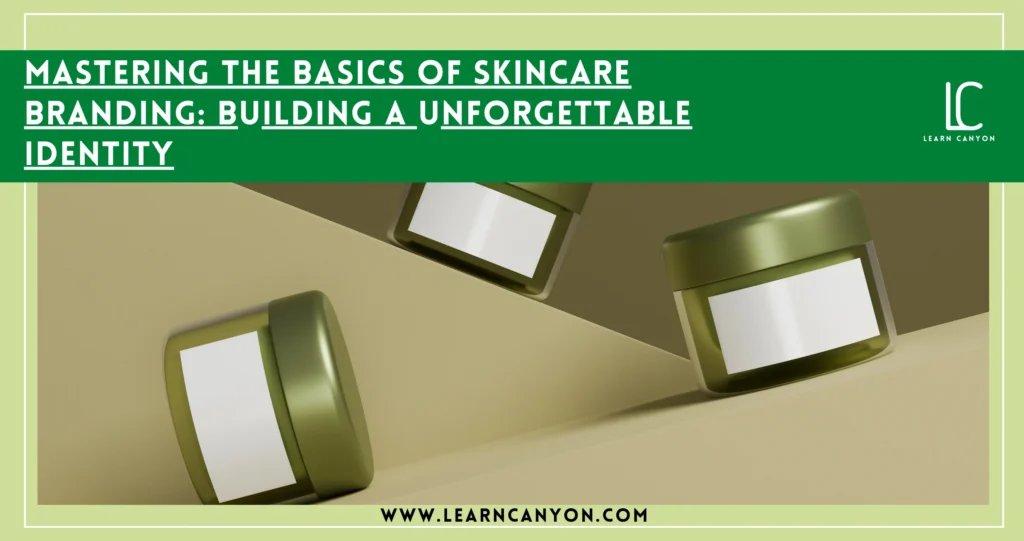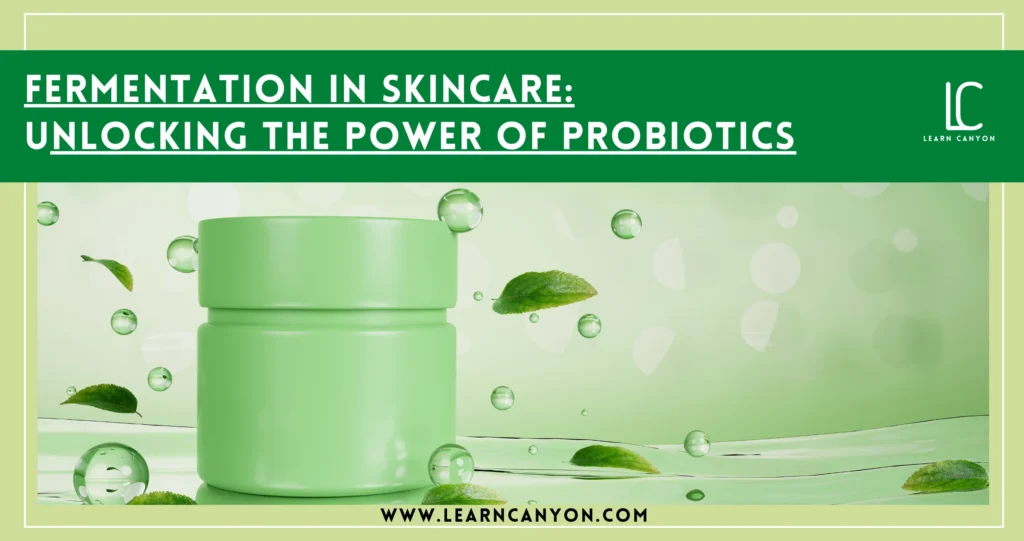You may get attracted to the terms ‘vegan’ and ‘cruelty-free’ while buying personal care items but did it ever come to your mind to find out the truth to research the formulations included in those beauty products?
To be honest, you might be an animal lover who eats a vegan diet and still contributes to animal cruelty through your skincare and haircare products that contain formulation. Where do you stand?
Apart from that, people become too biased and blindly focused only on their skincare but they ain’t even aware or educated enough to understand that their HAIR needs the exact attention the way they give that to their skin.
In this process, many of them fail to provide proper nutrition and care to their hair which leads to excessive hair fall, follicle issues, scalp diseases and so on.
Looking through the usage of vegan and cruelty-free hair care formulation will help you to understand what kind of nutritional component your hair needs. Using a vegan hair care brand has various advantages. Animal cruelty is completely absent in vegan hair care.
Sustainability and ethical choices are gaining momentum in vegan and cruelty-free haircare formulation. As a natural formulator, it is crucial to understand the significance of creating haircare products that are not only effective but also aligned with the values of conscious consumers.
In this blog/article, we will explore the essentials of vegan and cruelty-free haircare formulation, highlighting what every natural formulator needs to know before creating haircare products that are both kind to animals and beneficial for our hair.
Consumers Are Opting For Vegan Hair Care Formulation
More consumers are becoming aware of the widespread use and excessive consumerism of animal goods and byproducts.
The harmful environmental effects of sheltering billions of animals each year are the leading contributors to climate change.
Consumers do not want to be a part of the harmful environmental destruction and horrible animal abuse caused by industrial farming. As a result, they are opting for vegan formulations in haircare products.
Understanding Vegan and Cruelty-Free Haircare
Before jumping to a hypothetical conclusion, let us understand what exactly vegan and cruelty-free haircare is;
What Is Vegan Hair care?
Simply stated, vegan food does not contain any animal-derived goods, and vegan hair products do not contain any animal-derived ingredients.
They do not contain animal-derived compounds such as keratin, honey, lanolin, and others; rather these chemicals are replaced with natural components.
When shopping for hair care products and preparing hair care product formulation, seek substances like almond milk, vegetal hyaluronic acid, avocado oil, and other natural elements to help the environment and your hair.
What Is Cruelty-Free Hair care?
First and foremost, cruelty-free does not imply vegan, and vegan does not imply cruelty-free; these are two distinct concepts.
Cruelty-free hair care means that goods are not manufactured or formulated on animals. Unfortunately, this has not yet become standard practice, and many cosmetics and hair care products or chemicals are still tested on animals.
Significance Of Vegan & Cruelty-Free Hair care
- Plant-based components with high nutrient density are used in cruelty-free and vegan haircare products. These items are beneficial to your scalp, are more efficient with time, and do not hurt your scalp and health in any way.
- Many cosmetic items are tested on helpless animals held in harsh cages. You preserve the lives of those creatures by purchasing vegan and cruelty-free haircare products. That is a significant reason. Isn’t that right?
- Vegan hair products are typically free of chemicals. That is, they do not pollute the environment or create soil or water contamination when washed down drains. Furthermore, vegan hair products are environmentally friendly, with biodegradable packaging and delicate ingredients.
Growing Demand For These Products & Environmental Impact
The global vegan haircare market was estimated at USD 9.67 billion in 2021 and is expected to rise at a CAGR of 6.51% from USD 10.3 billion in 2022 to USD 18.7 billion in 2030.
Cruelty-Free cosmetics including both skincare and haircare market value to reach USD 14.23 Billion by 2030 at 4.56% CAGR – Market Research Future (MRFR) Report. This statistic is based on certain vegan products that do not go under the cruelty-free check. That’s why there are different market stats between the vegan and cruelty-free haircare market.
Exploring Vegan & Cruelty-free Haircare Formulation
By selecting vegan cosmetic formulations and products, consumers become part of the solution rather than the issue. Nowadays, there are more advanced ways to test cosmetics without torturing millions of animals (dogs, cats, and rabbits) with unnecessary testing.
Vegan haircare formulations have numerous hair benefits. The cosmetic formulator has access to a plethora of fantastic sustainable plant-based components. Vegan hair care products condition, soften, manage, shine, vitality, and vibrancy to the hair.
Before diving into vegan and cruelty-free hair care formulations, we need to understand that hair cosmetics are a significant technique in increasing patient adherence to alopecia and scalp remedies.
The formulations and modes of action of vegan and cruelty-free hair cosmetics, including shampoos, conditioners, hair straightening treatments, hair colors, and henna, as well as their prescription and safety must be investigated well.
The dermatologist’s knowledge of vegan hair care products, their use, and their potential side effects can extend to a grasp of cosmetic resources, allowing scalp experts to better treat hair and scalp disorders based on an assortment of hair types and ethnicities.
Read article on Plant-Based Skincare Formulations: Benefits And Challenges
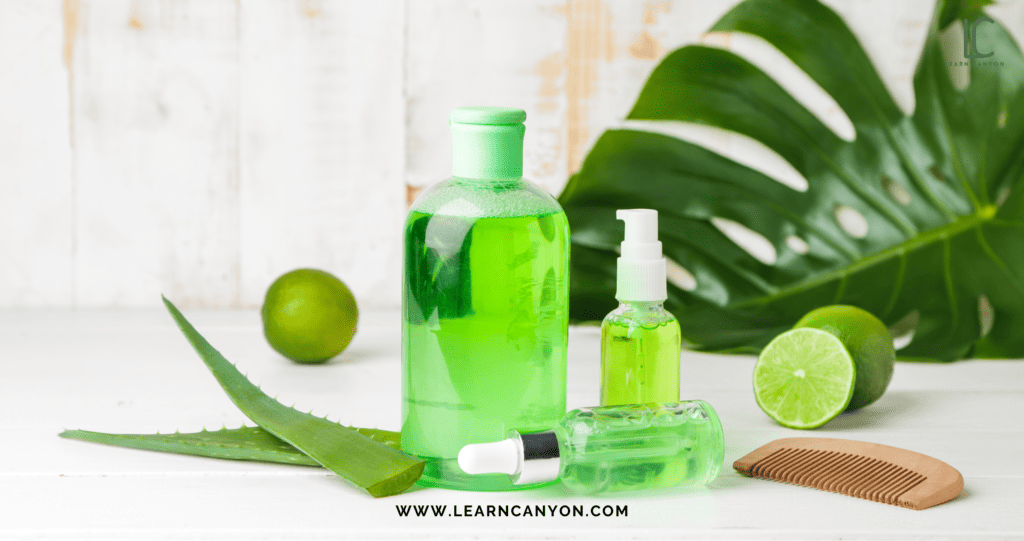
Vegan Haircare Formulation:
Vegan formulations are consistent with the concepts of empathy, ecological responsibility, and an all-vegan lifestyle.
The need for strong, healthy hair crosses all hair kinds and customer demographics, demonstrating the inextricable link between these two traits in the consumer’s perception. As the organic craze is on the top, consumers choose vegan hair products that promise significant advantages, with conditioning and strengthening at the top of the list.
A haircare formulator needs to consider viable points before formulating a vegan haircare formulation;
- Ingredient research and testing are extremely crucial for creating vegan haircare cosmetics. Some haircare products can be derived from both animal and plant sources, therefore it is critical to confirm the provenance of your components with the vendor before purchase. Always refer to the MSDS (Material Safety Data Sheet), which can be obtained through your supplier and contains a wealth of data regarding the origin, implementation, and usage of the component.
- Clarifying your market stance is especially critical when it comes to sensitive consumer topics like animal welfare. Use all of the resources at your disposal, such as your brand’s website, social media, and customer support, to clearly explain your opinion on these critical issues and make sure it highlights cruelty-free evidence.
- Vegan haircare product formulation will require eliminating some commonly used natural ingredients, such as beeswax, but it will also provide an excellent opportunity to experiment with lesser recognised ingredients and create novel formulae. Never assume that you can swap a non-vegan ingredient for a vegan one in the same ratio. Be ready to change your formulas, try new things, and be mindful of the influence of your ingredients on stability, challenge and cruelty-free testing.
- While formulating specific ethical needs, looking above your ingredients and into other areas of your organisation is critical to ensure that the same mentality flows throughout. Your formulation procedure, formulation laboratory, lab vessels, preventing cross-contamination and appropriate packaging are all things to think about.
Choosing the right VEGAN ingredients that are cruelty-free:
Learn Canyon formulations and courses are 100% vegan and have been for many years. We are the leading learning platform that offers 100% vegan advanced haircare formulation course.
Here are some of the plant-based vegan ingredients used in our haircare product formulation at Learn Canyon that are also tested cruelty-free;
- Plant peptides
- Plant collagen
- wild orchid
- Bilberry
- Plant stem cells
- Plant ceramides
- Calendula
- Hibiscus
- Horsetail
- Bamboo
- Sea Plants
- White Tea
- Moringa Oil
- Baobab Oil
- Coconut Oil
- Coffee Seed Oil
- Tamanu Oil
- Black Castor Oil
- Hemp Seed Oil
- Mango Butter
- Shea Butter
- Cocoa Butter
These vegan and cruelty-free ingredients will produce amazing outcomes for both the scalp and the hair.
This is what distinguishes each indie haircare formulator from mainstream culture corporations, and our Diploma in Organic Haircare Formulation teaches you to forego the DIY haircare recipes you frequently uncover online to create your entirely distinctive formulating conduct backed by solid practical skills and conceptual skills.
For instance, you might not be aware of how broccoli seed oil can be used as an organic substitute for silicones in hair care. Or how that kokum butter, a ‘drier’ butter, can be used to make a hair mask to combat greasy hair? And pumpkin seed oil is known to be a wonder oil for thinning hair.
Role of plant extracts, oils, and butter in vegan haircare formulation:
Plants have a variety of natural components that we use in our vegan hair products, including leaf, herbs and flower extracts or vegetable butter that moisturises and preserves, essential oils for scent, and vegan extracts that perform a wide range of functions. We often refer to them as ‘actives’ because they do so much.
- Plant Extracts Used In Hair care Formulation
Some of the plant extracts are;
- Arnica Montana or Arnica extracts: A member of the Asteraceae (Arnica) family. Its extracts stimulate hair follicles. Arnica oil has antibacterial and anti-inflammatory characteristics, which some feel make it beneficial as a cure for dandruff.
- Sage extracts: The tannins, saponins, borneol, and camphor are the main elements of S. officinalis (sage) and are responsible for their impact on hair. Along with it is an old favourite for dandruff, hair loss, and greasy hair and skin. If the papilla is dormant and not destroyed, a sage extract rubbed into the scalp can reduce dandruff, falling hair, and hair loss.
- Grape Seed extracts: It was revealed that proanthocyanidins isolated from grape seeds enhance hair follicle cell proliferation in vitro and had outstanding hair-cycle-converting action from the telogen to the anagen phase in vivo.
- Rosemary extracts: As a rinse, it is used in traditional medicine to stimulate hair growth. Caffeic acid and its derivatives, such as rosmarinic acid, are regarded to be the most important constituents of rosemary; these chemicals have antioxidant properties.
- Aloe Vera extracts: A. vera L. or A. barbadensis gel has traditionally been used to treat hair loss and enhance hair growth after alopecia. Aloenin is the main ingredient responsible for boosting hair growth while avoiding skin irritation.
- Plant-based essential oils In Haircare Formulation
Some of the vegan essential oils incorporated in haircare product formulation are;
- Bergamot oil: It comprises a variety of bioactive compounds in two fractions: volatile (93%-96%) and non-volatile (4%-7%). The first contains the monoterpene limonene (25%-53%) as well as a high concentration of oxygenated molecules such as linalool (2%- 20%), linalyl acetate (15%- 40%), -terpinene, and -pinene.
Bergamot essential oil has been shown in trials to be effective in the treatment of psoriasis and hair growth.
- Peppermint Oil: Menthol (30%- 50%), menthone (15%- 30%), menthyl acetate (2%- 9%), neomenthol (4%- 8%), 1,8- cineole (4%- 7%), isomenthone (2%- 4%), and menthofuran (1%- 7%) are the primary components of peppermint oil (Mentha piperita L.) described.
It can boost cutaneous cold receptor sensitivity by modulating the Ca2+ currents of neuronal membranes, as well as increasing penetration more effectively, especially when combined with limonene.
Antiviral, antimicrobial, antibacterial, and anti-inflammatory activities are found in peppermint oil. It also possesses strong antifungal, antioxidant, antiallergenic, and anticancer properties.
- Tea Tree Oil: Its main component, terpinen-4-ol,2,38, has antibacterial action. Terpinen-4-ol (39.1%) and delta-terpinene (20.4%) are also major components. Furthermore, alpha-terpinene, 1,8-cineole, p-cymene, terpinolene, and a-terpineol were discovered.
Because of its potential to inhibit tumour necrosis factor production, tea tree oil is used as an active ingredient in vegan haircare formulations to treat cutaneous infections. It is useful for treating furuncles, psoriasis, and fungal infections on the scalp.
- Geranium oil: Citronellol (38.0%), geraniol (16.0%), citronellyl (10.4%), and linalool (6.5%) are the most abundant volatile components in geranium oil (Pelargonium graveolens L.).
Several investigations have shown that EOs and extracts from Pelargonium graveolens have antibacterial and antifungal properties, as well as antioxidant and antitermitic properties that can heal scalp eczema, hair texture and other notorious scalp disorders.
- Vegan Butter Used In Haircare Formulation
Some of the most prominent and effective plant-based butters are;
- Shea Butter: Shea nuts, sourced from West Africa from the Vitellaria paradoxa tree, provide a superb, thick, emollient-like butter when processed. By using this butter, moisture is locked into your hair. Provides UV protection for your hair and scalp. Calms an inflamed scalp.
- Kokum Butter: Kokum butter is made from the seeds of the kokum, also known as the Garcinia tree. This yellow-white butter has a light aroma, is extremely emollient, and is easy to store due to its solid state at room temperature.
Kokum butter is particularly great for persons with sensitive scalps because it is non-irritating. Can be used in homemade hair scrubs.
- Tamanu butter: Also known as Foraha butter, is derived principally from the Calophyllum Inophyllum tree in Asia and Africa. It has numerous therapeutic hair benefits. It may be a lesser-known hair growth butter, but it can revitalize hair follicles, stimulate growth, and minimize hair fall.
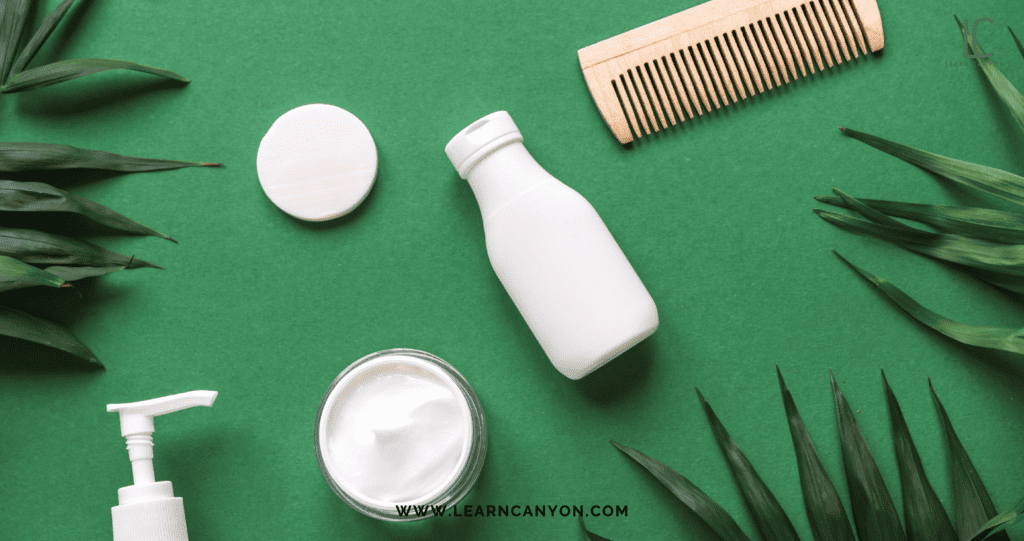
Truth About Cruelty-Free Haircare Formulation
While there is sometimes overlap between vegan and cruelty-free haircare formulations, it is crucial to emphasize that the phrases are not synonymous. Even if it includes animal-derived components an item can be cruelty-free without being vegan, and a vegan product should, but may not always, be cruelty-free.
There are various hair care products on the market that include animal research in their development. Because of the pain perpetrated on innocent beings in the pursuit of beauty, animal testing has created serious ethical problems. Among the animals commonly employed in testing are rabbits, mice, and guinea pigs.
Let us take a step further and inquire whether some farming practices and the area required for the cultivation and harvesting of cosmetic plants are harmful to animals, birds, and insects. Where should the line be drawn? As a vegan formulator, you will need to ask yourself to investigate these inquiries.
Although you can go through vegan and cruelty-free accreditation processes, you must consider your mission and ethics carefully, especially when communicating your haircare brand values to your customers.
Ineffectiveness and Biological Differences
One of the most compelling defences against animal research is its dubious scientific validity. Animals’ biological systems differ from those of humans, which might result in irregular and incorrect outcomes. This raises questions regarding the reliability of data received from animal research and its relevance to human hair health.
Animal Ingredients Used in ‘cruelty-free’ haircare cosmetics
Labelling things as ‘cruelty-free’ when they are free of animal testing but not of animal exploitation or slaughter is deceptive and incorrect.
Here are a few of the harsh animal elements that cosmetic brands use in their haircare formulation, knowingly or unknowingly;
- LANOLIN: Hair creams and various other hair products, to name a few are prepared from this animal component. Lanolin is a type of wool grease that is collected and cultivated by the wool industry. Wool is an abattoir business.
- KERATIN: Many typical hair products contain it. It is a protein derived from the crushed horns, hooves, feathers, and hair of various exploited and slain animals.
- TALLOW: Found in foundations, shampoos, hair serums, hair conditioners, lipsticks, and other cosmetics. Tallow is a type of solidified animal fat. Tallow is produced from the boiled carcasses of killed sheep and cows, from which the fatty substance is extracted.
- CASEIN: Hair conditioning products and face treatments contain it. Casein is a type of protein present in cow’s milk. Male baby calves are slaughtered in the dairy business because they do not produce milk. They also kill their milk-producing mothers when the farms are no longer profitable.
Other animal components that are secretly used in haircare brands are GUANINE, SQUALENE, GOAT’S MILK, CARMINE, SHELLAC, and GLYCERINE.
Alternative testing methods that don’t involve animals
Technology advancements have paved the path for more accurate, trustworthy, and humane testing methods. In-vitro testing, computer modelling, and tissue engineering are only a few possibilities for alternatives that can provide more meaningful data without causing harm to animals. These options not only save many lives but also produce more precise outcomes for human safety.
Importance Of CRUELTY-FREE Certifications
Leaping Bunny
The Leaping Bunny emblem is one of the most well-known cruelty-free hair cosmetics logos. This mark is internationally recognised and assures consumers that no damaging or cruel animal tests were carried out while the haircare product was being manufactured.
PETA Accreditation
PETA stands for (People for the Ethical Treatment of Animals) and to be certified by PETA, a haircare brand must complete a questionnaire and sign a statement stating that they do not conduct animal experimentation on the ingredients of their goods now or in the future.
That’s why we at Learn Canyon provide a PETA-approved cruelty-free haircare formulation course that will help you become a vegan haircare formulator to help you stay aware of not harming animals and will give you a satisfaction guarantee of formulating plant-based haircare products.
Sustainable Packaging In Vegan and Cruelty-Free Haircare Industry
To decrease the negative ecological effects of product waste and to stop harming animals, sustainable packaging can be produced from a variety of materials. Some of those packaging are;
1. Post-Consumer Packaging
This method, also known as Post-consumer Recycled (PCR) packaging, makes use of recycled materials such as cardboard boxes, folding cartons, plastic bottles, paper, aluminium, and other everyday objects. Once sufficient elements have been collected, they are transported to a recycling centre where they are separated and formed into bales. The bale is then moulded into the desired shape and size of new goods.
2. Bamboo Packaging
Bamboo wood is frequently used to produce cosmetic jars that are lined with an acrylic or glass coating. Different species of bamboo are typically planted to increase the durability and variety of your products. And when discarded after use, no animals will be harmed even if they consume bamboo-made packages.
3. Paper packaging
Paper packaging is a popular alternative to plastic packaging since it is biodegradable, renewable and cruelty-free.
4. Cornstarch Packaging
Organic substances that are biodegradable and easy to recycle are frequently used in sustainable materials. Cornflour packaging is created by fermenting plant sugar and starch with polylactic acid (PLA).
Other such biodegradable packaging are Aluminium, Glass, Beeswax, and Refillable packaging.
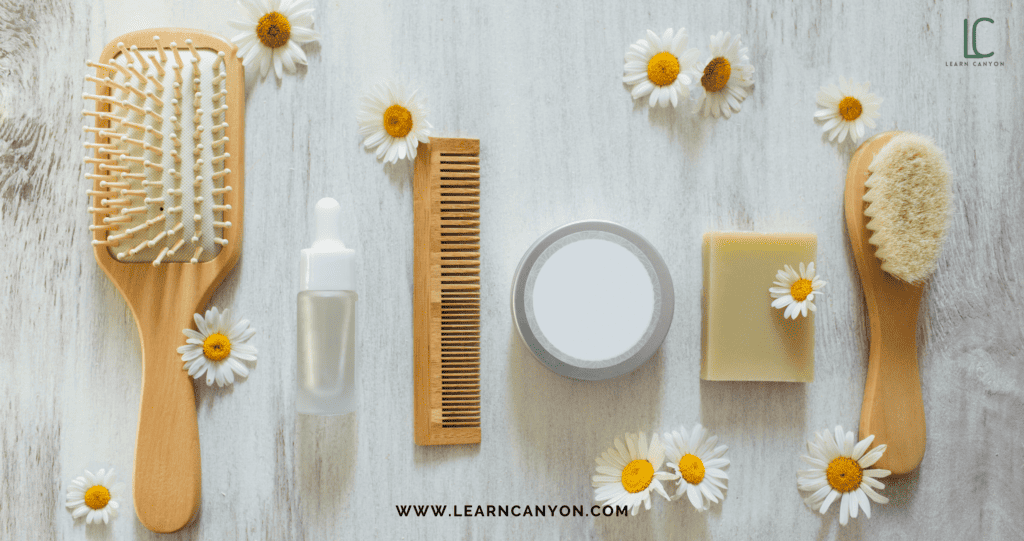
Concluding The Journey
Making the switch to vegan and cruelty-free haircare products can have a significant impact on those around you. As a vegan haircare formulator, your endeavour to create vegan and cruelty-free cosmetics encompasses your ethical beliefs, compassion, and devotion to sustainability.
We have addressed the intricacies of navigating the world of vegan and cruelty-free haircare formulation in this blog article, providing vital insights that will assist you if you incorporate these requirements in your formulating and brand goal.
With this knowledge, you can rely on Learn Canyon as we are firmly devoted to working on and developing hair care products that do not hurt any living creature, including our planet, Earth. Make sure to contact us if you have any queries about this material or would like to provide feedback to our founders.




